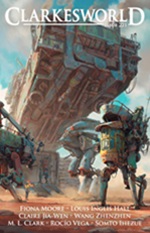 Clarkesworld #221, February 2025
Clarkesworld #221, February 2025
“Bodyhoppers” by Rocío Vega, translated by Sue Burke
“King of the Castle” by Fiona Moore
“We Begin Where Infinity Ends” by Somto Ihezue
“A Planet Full of Sorrows” by M. L. Clark
“The Hanging Tower of Babel” by Wang Zhenzhen, translated by Carmen Yiling Yan
“Numismatic Archetypes in the Year of Five Regents” by Louis Inglis Hall
“Celestial Migrations” by Claire Jia-Wen
Reviewed by Mike Bickerdike
This issue of Clarkesworld offers 2 novelettes and 5 short stories.
“Bodyhoppers” by Rocío Vega (translated by Sue Burke) concerns the protagonist, of indeterminate gender, ‘bodyhopping’ their mind from one stolen body to another body in an effort to try to get home. As the pirating of other bodies isn’t legal, the character goes through this procedure via a backstreet surgeon. The story spends a lot of time on the danger and attempt to ‘bodyhop’ but doesn’t spend enough time describing or developing character or providing a clear background to sympathetically draw the reader in, resulting in a rather dry story.
“King of the Castle” by Fiona Moore is a story set in a dystopian world in which technology, laws, and society have apparently broken down. In a small town a young man is causing trouble, threatening children and killing livestock. Rather than evict the man, a local invites him to train the town’s rugby team, with mixed results. This more-or-less summarises the whole tale. Where masters of SF, such as Simak, were able use parochial settings and storylines to convey larger ideas with depth and pathos, this story remains small in outlook throughout, having little to say relating to any larger context.
“We Begin Where Infinity Ends” by Somto Ihezue is an SF novelette set in a future Africa, in which many species face extinction, including fireflies. Two twelve year old friends hatch a plan to modify the streetlights in their town to encourage firefly survival. Essentially a coming-of-age story that explores the friendship and sexuality of the boys, this is quite well written and constructed. The start is engaging, but it promises more in the way of SF ideas than it ultimately delivers, with the tale centring on the boys’ romance more than anything else.
“A Planet Full of Sorrows” by M. L. Clark is a space-opera novelette that seems overly long for the story it has to tell. Enroute to scout a new world, a small tight-knit spaceship team loses one of their members to an accident. Following this event they arrive at the planet they are to scout, and there discover alien architecture and evidence of non-corporeal alien life. On the face of it, this is a very promising set up for the novelette, but unfortunately it fails to deliver in a satisfying way. The death of the colleague leads to a good deal of grief and introspection by all the crew, which we read about in more than enough detail. While this is an interesting way to introduce characters and add colour to the plot, it doesn’t ultimately serve very much purpose. The inner thoughts of the main protagonist take up a large part of the tale, which starts to wear thin midway through. Additionally, the dramatic tension set up in the story doesn’t work especially well, as the ‘threat’ is distant and uninvolving, and the characters’ solution not only seems unlikely but also provides no real pay-off.
“The Hanging Tower of Babel” by Wang Zhenzhen (translated by Carmen Yiling Yan) is better than the preceding stories. An old astronaut has Alzheimer’s disease and lives his last years with his son. Spacefaring and exploration had been enabled by the building of the ‘Stairway to Heaven’ space elevator, providing a life of adventure and danger for the old man, at the expense of seeing his boy grow up. In a protracted economic downturn, the ‘Stairway’ is no longer viable, and space exploration has ground to a halt. The story therefore recounts the parallel degradation of the health and values of the old man, with the structures that supported it. There’s a good sense of pathos here, it’s written in an appealing gentle style, and the events are convincing.
“Numismatic Archetypes in the Year of Five Regents” by Louis Inglis Hall is a well-told and interesting fantasy short story. Coin makers of a small mint create new coins for the rulers of their city-state. The story is told in sections, with each section beginning with the description of a coin that was minted during the time period described in the story section that follows. This structure is interesting and works quite well. Speculative fantasy or SF elements are very limited here, but it provides a good read, nonetheless.
“Celestial Migrations” by Claire Jia-Wen is a densely written SF tale that is very hard to penetrate. Chock-full of purple prose and unexplained events, and avoiding clarity at every opportunity, the author makes the reader do all the heavy lifting. The story is essentially space opera, set on a mining colony. Exactly what it’s about (or what is going on) is not crystal clear to this reviewer. Skip this poor story.
More of Mike Bickerdike’s reviews and thoughts on science-fiction can be found at https://starfarersf.nicepage.io/